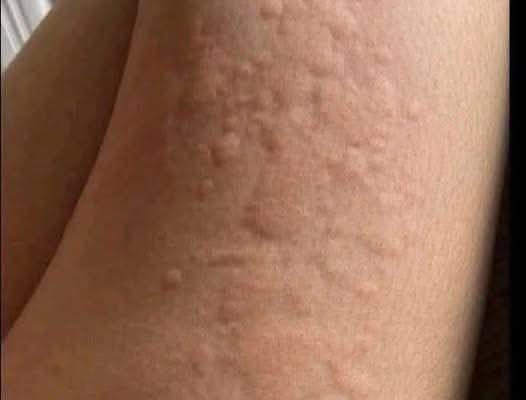It started as nothing more than a faint itch on James’s forearm—barely noticeable at first. A few scratches here and there. He chalked it up to dry air or maybe a bit of dust. But within days, the itch spread. First to his upper arms, then down his legs. What once was mild became relentless. Especially at night, the sensation became unbearable, stealing his sleep and creeping into every part of his daily routine.
James had changed nothing—no new laundry detergent, no different soap, no tweaks to his diet. And yet, his skin was erupting in tiny, red, raised bumps that seemed to appear out of nowhere.
Like many people, he initially tried to brush it off. A quick run to the drugstore. Over-the-counter antihistamines. Hydrocortisone cream. None of it worked. As the days turned into weeks, James realized this wasn’t a passing irritation.
And he was right.
The Real Diagnosis: Chronic Urticaria
Finally, James scheduled a visit to a dermatologist. The specialist asked detailed questions, ran a few tests, and examined his skin closely. The diagnosis: chronic urticaria—also known as chronic hives.
Unlike the common, short-lived hives caused by food allergies or insect bites, chronic urticaria can last for weeks, months, or even years, and often has no clear trigger.
In James’s case, there were no obvious allergens or irritants to blame. Instead, his immune system was misfiring—responding as if there were a threat when none existed. For some, this kind of overactive immune response can be triggered by:
Stress
Infections (even mild, unnoticed ones)
Underlying autoimmune issues
Environmental factors that don’t show up on typical allergy panels
James learned that he wasn’t alone. Thousands of adults develop chronic urticaria each year, often out of nowhere. And while it’s not life-threatening, the constant discomfort, interrupted sleep, and social anxiety caused by visible flare-ups can have a serious impact on mental and physical health.
What Helped James Find Relief
Once diagnosed, James was prescribed a targeted treatment plan:
A daily non-drowsy antihistamine, at a higher dose than what’s sold over the counter
A second medication designed to reduce immune system overreaction
Lifestyle adjustments to reduce stress and avoid known triggers
Within weeks, James noticed a difference. The flare-ups became less frequent. The itching subsided. For the first time in months, he slept through the night without scratching himself raw.
But most importantly, James felt empowered. He no longer felt like he was battling an invisible enemy. He had a name for what was happening—and a plan to manage it.
When an Itch Is a Signal, Not a Surface Problem
It’s easy to dismiss itchy skin as something trivial. We’ve all experienced it: dry skin in the winter, the occasional bug bite, maybe a mild rash after using a new soap.
But persistent, unexplained itching can signal something deeper—and ignoring it may delay diagnosis and relief.
When to See a Doctor About Itchy Skin
If you notice any of the following symptoms, it’s time to reach out to a healthcare provider:
Itching that lasts more than a few days, especially if it spreads or worsens
Red, raised, or swollen bumps that appear and disappear repeatedly
Itching that interferes with sleep or daily life
Swelling of the lips, face, or tongue—which can be signs of a serious allergic reaction (seek emergency care)
No improvement from standard treatments, such as antihistamines or creams
Waiting too long can make things worse—not just physically, but emotionally, too. Chronic skin conditions are known to impact mental health, leading to frustration, anxiety, and even depression when left untreated.
It’s Not “Just Skin” — It’s Your Body Talking to You
One of the biggest misconceptions people carry, especially as they age, is that skin issues are only skin-deep. In truth, the skin is your body’s largest organ—and it often gives you the first sign that something’s wrong internally.
In James’s case, it was his immune system sending false alarms. In others, itchy skin can point to problems like:
Liver or kidney issues
Thyroid imbalances
Nutrient deficiencies
Hidden infections
Autoimmune disorders
That’s why paying attention matters. Dismissing symptoms may feel like the practical thing to do—after all, who wants to sit in another doctor’s office? But those seemingly minor irritations can be early clues to bigger health issues that are best treated early.
James’s New Normal—and Why It Matters
Today, James manages his condition well. He knows his triggers, takes his medications, and keeps regular appointments with his dermatologist. He also prioritizes sleep, stress relief, and hydration—all of which play a role in keeping his symptoms at bay.
He still has occasional flare-ups. But he’s no longer stuck in the cycle of confusion and discomfort.
And if there’s one thing he tells people now, it’s this:
“Don’t wait for it to get worse. If something doesn’t feel right, listen to your body.”
Your Body Is Speaking—Are You Listening?
That itch that won’t go away? It might not be just dry skin. It could be something more—and getting it checked could lead to peace of mind, better sleep, and real relief.
So don’t ignore the signs. Like James, you might find that the key to feeling better starts with understanding what’s really going on beneath the surface.



